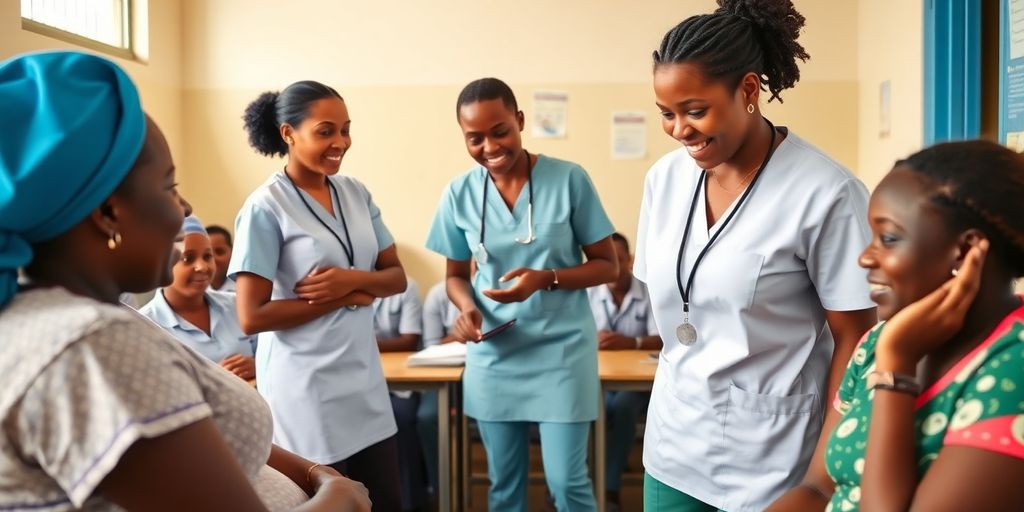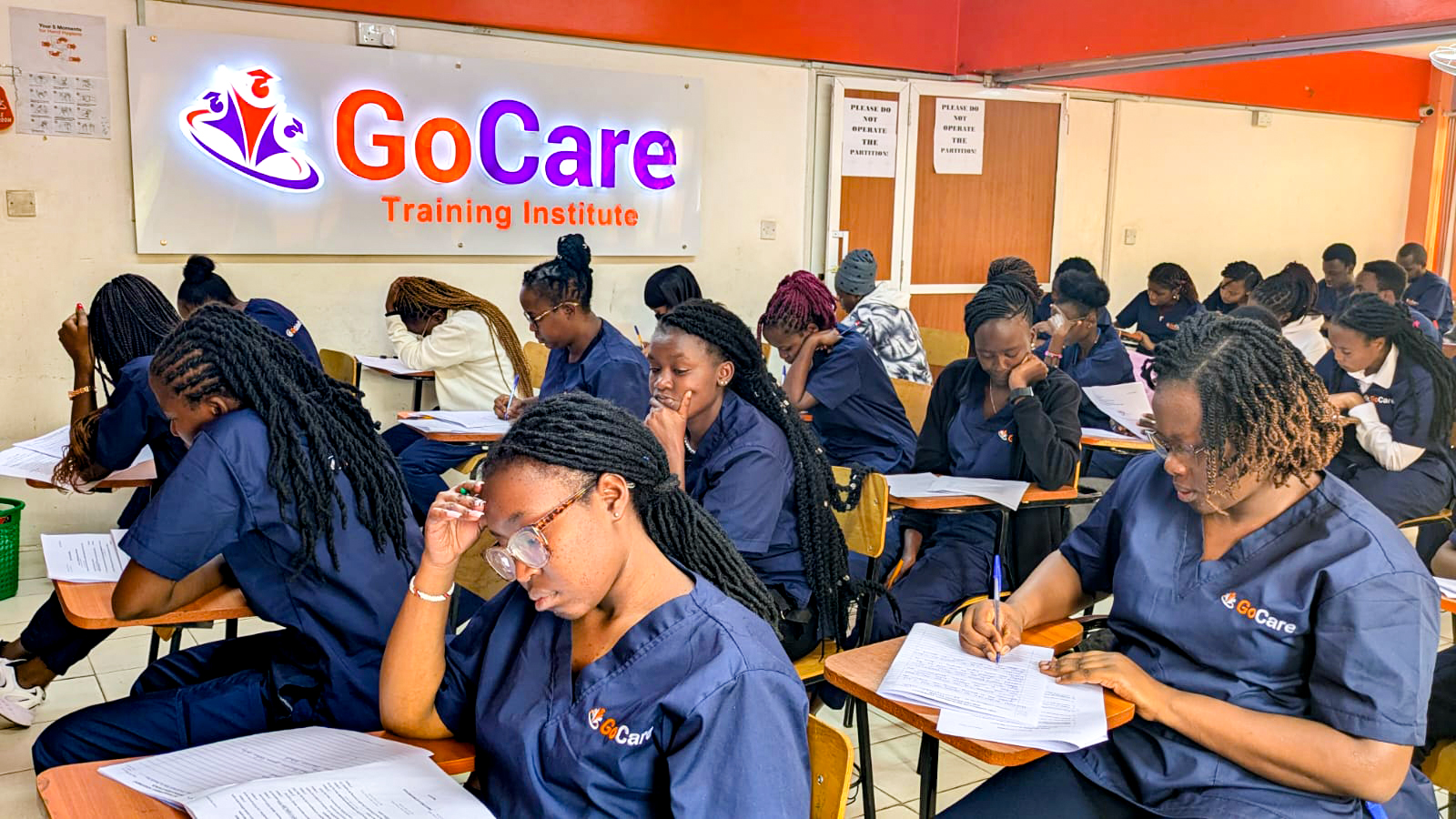Nursing education in Nairobi’s suburbs is gaining traction, with various institutions offering programs that cater to the growing demand for qualified healthcare professionals. Among these, GoCare Institute stands out for its comprehensive nursing courses designed to equip students with the necessary skills and knowledge for a successful career in nursing. This article explores the landscape of nursing education in Nairobi’s suburbs, focusing on the offerings at GoCare Institute, career opportunities for graduates, and the challenges and future trends in the field.
Key Takeaways
- Nursing education in Nairobi suburbs is critical for addressing healthcare needs.
- GoCare Institute offers a range of nursing programs including diplomas and bachelor’s degrees.
- Nursing graduates can find diverse career opportunities in hospitals, community health, and education.
- Hands-on experience is emphasized through internships and community health projects.
- Accreditation and recognition are essential for nursing programs to ensure quality education.
Overview Of Nursing Education In Nairobi Suburbs
Nursing education in Nairobi’s suburbs is evolving, trying to meet the growing healthcare demands. It’s not just about textbooks anymore; it’s about practical skills and real-world experience. The goal is to train nurses who can handle diverse healthcare settings, both locally and potentially even internationally. It’s a pretty big deal, especially with the increasing need for qualified healthcare professionals.
Importance Of Nursing Education
Nursing education is super important because it directly impacts the quality of healthcare. Well-trained nurses are better equipped to provide effective patient care, manage complex medical situations, and contribute to overall public health. Proper education ensures nurses have the knowledge, skills, and ethical grounding to handle the challenges of modern healthcare. Plus, it opens doors to career advancement and specialization.
Types Of Nursing Programs Available
You’ve got a few options if you’re looking into nursing programs around here. There are diploma programs, which are usually shorter and more focused on practical skills. Then there are Bachelor of Science in Nursing (BSN) degrees, which offer a more comprehensive education, including research and leadership skills. And for those who want to specialize or advance their careers, there are postgraduate programs like Master of Science in Nursing (MSN) and even PhD programs. The nursing education landscape is diverse, catering to different career goals and educational backgrounds.
Key Institutions Offering Nursing Courses
Several institutions in Nairobi’s suburbs offer nursing courses. These range from universities with established nursing schools to specialized nursing colleges. Some of the well-known ones include:
- GoCare Institute
- University of Nairobi (though technically not in a suburb, it serves the area)
- Aga Khan University School of Nursing and Midwifery
These institutions vary in their program offerings, accreditation, and teaching methodologies. It’s a good idea to research each one to find the best fit for your needs. They also have different community health projects available.
Nursing education in Nairobi’s suburbs faces unique challenges, including resource limitations and access to quality training. However, these institutions are working hard to provide relevant and up-to-date education to meet the healthcare needs of the community.
Nursing Courses Offered At GoCare Institute
So, you’re thinking about nursing courses at GoCare Institute? That’s cool. Let’s break down what they actually offer. It’s not just about textbooks and classrooms; it’s about getting ready for the real world.
Diploma In Nursing
This is usually the starting point for many. The Diploma in Nursing program is designed to give you a solid base in nursing principles and practice. You’ll learn the basics of patient care, anatomy, and pharmacology. It’s a hands-on course, so expect lots of practical training. It’s a good stepping stone if you’re not quite ready for a full degree, or if you want to get into the field quickly.
Bachelor Of Science In Nursing
If you’re aiming higher, the Bachelor of Science in Nursing (BSN) is the way to go. This program goes deeper into the theoretical and practical aspects of nursing. You’ll cover advanced topics like research, leadership, and community health. A BSN can open doors to more specialized roles and higher pay. Plus, it’s often a requirement for advanced nursing positions.
Postgraduate Nursing Programs
Got your BSN already? Then postgraduate programs are where it gets interesting. These are for nurses who want to specialize in a specific area, like critical care, pediatrics, or mental health. Postgraduate programs usually involve a mix of coursework, clinical practice, and research. They’re designed to make you an expert in your chosen field.
Choosing the right nursing program depends on your goals and where you are in your career. Think about what you want to achieve and pick a course that aligns with that. Don’t just go for the easiest option; challenge yourself and aim high.
Career Opportunities For Nursing Graduates

Nursing graduates have a lot of options, which is pretty cool. It’s not just about working in a hospital anymore (though that’s still a big part!). The skills you learn in nursing school can take you down many different paths. Let’s look at some of the possibilities.
Roles In Healthcare Facilities
Okay, so hospitals and clinics are the obvious ones. But even within those settings, there’s a ton of variety. You could be working directly with patients, administering medication, monitoring vital signs, and providing emotional support. Or, you might find yourself in a more specialized role, like in the ICU or the emergency room. It really depends on your interests and what kind of environment you thrive in. Some nurses also go into management positions, overseeing other nurses and ensuring that everything runs smoothly. It’s a big responsibility, but it can be really rewarding.
Opportunities In Community Health
This is where things get interesting. Community health nursing is all about going out into the community and providing care to people where they live. This could mean working in schools, community centers, or even people’s homes. You might be providing vaccinations, educating people about health issues, or helping them manage chronic conditions. It’s a chance to make a real difference in people’s lives and to address health disparities in underserved communities. Plus, you get to see a different side of healthcare than you would in a hospital setting. It’s definitely not a 9-to-5 job, but it can be incredibly fulfilling. Community health is growing.
Positions In Nursing Education
If you love nursing and you also love teaching, then nursing education might be the perfect fit for you. You could work as a clinical instructor, helping nursing students develop their skills in a hospital setting. Or, you could teach courses in a classroom, sharing your knowledge and experience with the next generation of nurses. It’s a chance to shape the future of nursing and to inspire others to pursue this important profession. Plus, you’re always learning new things yourself, which keeps things interesting.
Nursing is a field that is constantly evolving, and there are always new opportunities to explore. Whether you’re passionate about direct patient care, community health, or education, there’s a place for you in the nursing profession. It’s a challenging but rewarding career that offers the chance to make a real difference in the world.
Community Engagement And Practical Experience

Internship Opportunities
Getting real-world experience is super important in nursing. It’s not just about textbooks and lectures; you need to see how things work in a real healthcare setting. Internships give you that chance. You get to work alongside experienced nurses, learn from them, and apply what you’ve learned in school. It’s a great way to build confidence and figure out what kind of nursing you’re most interested in. Plus, it looks great on your resume when you’re job hunting.
Community Health Projects
Nursing isn’t just about hospitals; it’s also about taking care of people in the community. Community health projects let you get involved in things like health education, disease prevention, and basic healthcare services. This is where you can really make a difference in people’s lives, especially in underserved areas. You might be helping with vaccinations, teaching people about hygiene, or providing basic medical care. It’s a chance to see the social determinants of health firsthand and understand how they impact people’s well-being.
Collaborations With Local Hospitals
Nursing programs often team up with local hospitals to give students more opportunities for clinical experience. These collaborations mean you get to rotate through different departments, work with diverse patient populations, and see a wide range of medical conditions. It’s a chance to network with potential employers and get your foot in the door at a hospital you might want to work at after graduation.
These partnerships are beneficial for everyone involved. Students get valuable experience, hospitals get extra help, and the community benefits from improved healthcare services.
Specialized Nursing Programs
Nursing isn’t just one thing; it’s a field with many paths. If you’re looking at nursing courses in Nairobi suburbs, you’ll find options to focus on specific areas. These specialized programs let you develop in-depth skills and knowledge in a particular area of healthcare. Let’s explore some of these options.
Critical Care Nursing
Critical care nursing is all about taking care of patients who are seriously ill or unstable. These nurses work in intensive care units (ICUs) and other high-acuity settings. They need to be quick thinkers, good under pressure, and have a strong understanding of complex medical conditions. You’ll learn how to use advanced equipment, administer medications, and provide life-saving interventions. It’s a challenging but rewarding field for those who want to make a difference in the most critical moments. Consider the program’s fees structure when planning your education.
Pediatric Nursing
Pediatric nursing focuses on the healthcare needs of children, from newborns to adolescents. It’s not just about giving medicine; it’s about understanding child development, communicating with kids of all ages, and supporting their families. Pediatric nurses work in hospitals, clinics, schools, and other settings. They provide routine checkups, treat illnesses, and help children manage chronic conditions. A big part of the job is making kids feel comfortable and safe, even when they’re scared.
Mental Health Nursing
Mental health nursing is a specialized area that deals with the diagnosis, treatment, and prevention of mental illnesses and emotional problems. These nurses work with individuals, families, and groups in a variety of settings, including hospitals, clinics, and community centers. They provide therapy, administer medications, and help patients develop coping skills. Empathy and communication are key in this field, as you’ll be working with people who are often vulnerable and in distress.
Specialized nursing programs are designed to equip nurses with the advanced knowledge and skills required to excel in their chosen field. These programs often involve a combination of classroom learning, clinical experience, and research, providing a well-rounded education that prepares graduates for leadership roles in healthcare.
Accreditation And Recognition Of Nursing Programs
It’s super important to make sure any nursing program you’re looking at is legit. You want to know that the education you’re getting is up to par and will actually help you in your career. Let’s break down what to look for.
National Accreditation Standards
Okay, so first things first: national accreditation. This basically means that a recognized body in Kenya has checked out the nursing program and said, “Yep, this meets our standards.” Think of it like a stamp of approval. These standards cover everything from the curriculum to the qualifications of the instructors. If a program doesn’t have this, it might be a red flag. You can usually find info about accreditation on the institution’s website, or by checking with the Nursing Council of Kenya. It’s worth the effort to confirm JDS aims to enhance human resource development.
International Recognition
Now, let’s talk about going global. Some nursing programs in Nairobi suburbs also have international recognition. This means that their qualifications are recognized in other countries. This can be a huge advantage if you’re thinking about working abroad someday. International recognition often comes through partnerships with universities or accreditation bodies in other countries.
Partnerships With Global Institutions
Speaking of partnerships, many nursing schools team up with global institutions. These partnerships can offer students opportunities for exchange programs, joint research projects, and access to resources they might not otherwise have. For example, the University of Nairobi’s School of Nursing Sciences has partnered with AMREF to roll out countrywide BSc. Nursing Upgrading Program through e-Learning. These collaborations can really boost the quality of education and open doors for graduates.
Challenges Facing Nursing Education In Nairobi Suburbs
Nursing education in Nairobi suburbs, while promising, faces several hurdles that impact the quality and accessibility of training. It’s not all smooth sailing, and there are definitely some bumps in the road that need addressing to ensure we’re producing top-notch nurses.
Resource Limitations
One of the biggest problems is the lack of resources. Limited funding often translates to outdated equipment, insufficient learning materials, and inadequate facilities. Labs might not have the latest technology, libraries might lack current textbooks, and classrooms could be overcrowded. This directly affects the quality of practical training and theoretical understanding. It’s tough to learn effectively when you don’t have the right tools. For example, many institutions struggle to maintain a sufficient supply of essential medical equipment for hands-on training, forcing students to share or use outdated models. This is a big deal because it means they’re not getting the real-world experience they need. Addressing education in Kenya requires strategic investment in resources.
Access To Quality Training
Not all nursing programs are created equal. The quality of training can vary significantly between institutions. Some schools may lack experienced faculty, standardized curricula, or sufficient clinical placements. This can lead to graduates who are not fully prepared for the demands of the profession. It’s a real concern when you hear stories of students graduating without having had enough hands-on experience in a hospital setting. It’s like learning to drive a car without ever getting behind the wheel.
Ensuring consistent quality across all nursing programs is essential. This involves regular assessments, standardized curricula, and ongoing professional development for faculty. Without these measures, we risk producing nurses who are not adequately equipped to provide quality care.
Retention Of Qualified Staff
Keeping qualified nursing instructors is a constant battle. Many experienced nurses are drawn to better-paying positions in hospitals or private practice, leaving a shortage of skilled educators. This brain drain can negatively impact the quality of instruction and mentorship available to students. It’s a tough situation because you need experienced nurses to train the next generation, but they’re often lured away by more lucrative opportunities.
Here are some factors contributing to staff turnover:
- Better salaries in clinical settings
- Limited opportunities for professional growth in educational institutions
- Lack of recognition and support for teaching roles
Future Trends In Nursing Education
Integration Of Technology In Nursing
Nursing education is changing, and it’s exciting! We’re seeing more tech in the classroom and in training. Think about it: students can now use simulations to practice complex procedures without any risk to real patients. It’s like a video game, but with real-world consequences. This prepares them better for the fast-paced environment of modern healthcare. The impact of technology on nursing education is huge, and it’s only going to get bigger. virtual and augmented reality are becoming more common.
E-Learning Opportunities
E-learning is also becoming a big deal. More courses are available online, which means students can learn at their own pace and on their own schedule. This is great for people who have other commitments, like family or work. Plus, online resources are often more accessible and affordable than traditional textbooks. It’s not just about convenience, though. E-learning can also offer a more interactive and engaging learning experience.
- Online simulations
- Virtual patient interactions
- Access to global experts
Focus On Holistic Nursing Practices
There’s a growing emphasis on holistic nursing. It’s not just about treating the illness; it’s about caring for the whole person – mind, body, and spirit. This means nurses need to be trained in communication, empathy, and cultural sensitivity. It’s about understanding the patient’s background, beliefs, and values, and tailoring care to meet their individual needs. It’s a more human-centered approach to healthcare, and it’s becoming increasingly important.
Nursing education is moving towards a more integrated and patient-centered approach. This includes not only technical skills but also the ability to connect with patients on a deeper level and understand their unique needs.
Final Thoughts on Nursing Education in Nairobi Suburbs
In conclusion, nursing courses in the suburbs of Nairobi offer a solid foundation for aspiring nurses. With a mix of practical skills and theoretical knowledge, these programs prepare students for various roles in healthcare. Graduates can find opportunities not just locally, but also regionally and globally. The partnerships between institutions like the University of Nairobi and organizations like AMREF enhance the learning experience, making it more accessible through e-learning. As the demand for qualified nurses continues to grow, these courses are vital for shaping the future of healthcare in Kenya. Whether you’re looking to start your nursing career or advance your education, the options available in Nairobi’s suburbs are worth exploring.
Frequently Asked Questions
What types of nursing programs can I find in Nairobi suburbs?
In Nairobi suburbs, you can find various nursing programs such as diploma courses, bachelor’s degrees, and postgraduate studies.
Which institutions offer nursing courses in Nairobi suburbs?
Several institutions, including GoCare Institute and the University of Nairobi, provide nursing education in the suburbs of Nairobi.
What career paths are available for nursing graduates?
Nursing graduates can work in hospitals, community health, and even in educational roles, like teaching future nurses.
Are there practical training opportunities for nursing students?
Yes, nursing students often participate in internships and community health projects to gain hands-on experience.
What specialized nursing programs are available?
Students can pursue specialized programs in areas like critical care nursing, pediatric nursing, and mental health nursing.
How are nursing programs accredited in Nairobi?
Nursing programs in Nairobi are accredited by national bodies and may also receive international recognition for quality.



